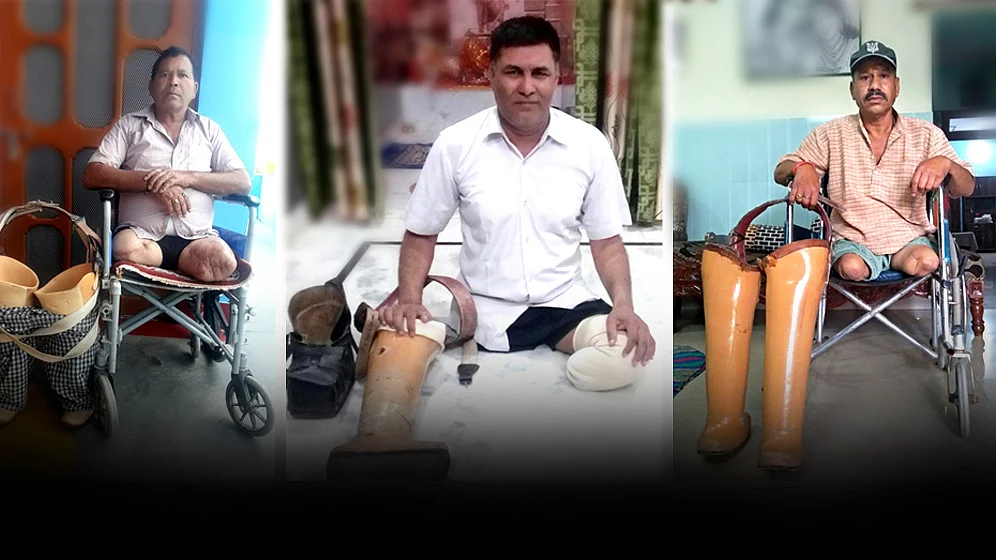Disabled soldiers vow to fight stark discrimination, seek pension hike
The disability pension, according to retired disabled soldiers, should be fixed on the basis of nature of physical disability or injury attributable to military service and not rank and service years

After having received 31 bullets, undergoing multiple surgeries followed by subsequent leg amputations and losing half the body weight, Havildar Rajan Mehra, a Sena Medal awardee for his exceptional gallantry, feels betrayed.
“It would have been far better had I died in the militant attack in Nagaland in 1997 rather than surviving it all,” says the decorated para-commando—who claims to have trained some of the soldiers who carried out surgical strike inside Pakistan. “When a soldier gets killed, his body is sent home draped in tricolour. After watching it on TV, a sentimental nation feels patriotic for a while and then both the country and the government just forget him,” Mehra, tells The National Herald, declaring, “I feel like a ‘joker’ after becoming physically disabled.”
“An officer who becomes 100 per cent disabled—just like me—is entitled to a total monthly pension of ₹2.65 lakh but I get only pittance that is ₹26,000,” Mehra, a resident of Dwarahat, Uttrakhand says, lamenting financial hardships and inadequate pension and recalling how courageously he fought battles in Sri Lanka, Kashmir and North-East before an encounter in Nagaland left him invalid for life.
“The retired officers get higher pensions, we don’t have any objection. But disability pension should be solely based on nature of physical disability or injury attributable to or aggravated by military service. There should be no discrimination on the basis of rank and number of service years,” says general secretary of the Sabka Sainik Sangharsh Committee, an organisation working for the rights of soldiers, Harbhal Singh (41)—who suffered 75 per cent disability after his left leg got injured in an ID blast in Kashmir. He was 33 then and was eventually discharged from the service.
While a slab-based system — ₹27,000 a month for officers, ₹17,000 for junior commissioned officers (JCOs), and ₹12,000 for all other ranks—was recommended by the seventh central pay commission, it was rejected by the Union Cabinet presided over by Prime Minister Narendra Modi. Heeding to the demand of officers, the Union Cabinet reverted to the percentage-based regime for disability pension wherein the “service component” remains unchanged.
“Under the old percentage based regime, if an Army, Navy and Air Force personnel loses a hand, suffering 50 per cent disability in the line of duty, both jawan and officer are entitled to a disability pension matching fifty per cent of their last pay drawn,” explains Nalin Talwar, spokesperson of the Committee, asserting that, “due to huge difference between the salaries of jawans and officers, it’s a highly discriminatory mechanism.”

Modi government recently celebrated second anniversary of surgical strike, Parakram Parv, from September 28-30 in 51 cities across the country. The retired disabled soldiers lament that Modi government—which launched an electronic and print media blitz glorifying surgical strike through articles, books, TV debates, and documentaries—politicised surgical strike and Armed forces to garner voters but did little for them.
While ex-servicemen are already peeved with Modi government on the 'one rank, one pension' issue, now the disabled retired soldiers have decided to go on hunger strike from November 15 at Ramlila Maidan, New Delhi. One of their longstanding grouse remains that the disabled jawans usually have to fight prolonged legal battles for their dues and pensions whereas the Ministry of Defense (MoD) allegedly spends crores of rupees on batteries of lawyers to deny adequate pensions and other dues to the disabled and war widows, knowing many of them don’t have the means to fight legal battles.
“Due to government’s apathy, the junior Armed forces retirees have been living a miserable life,” Singh laments, adding that “most of the soldiers—who have decided to sit on hunger strike from November 15 on, are 100 per cent physically disabled and are dependent on others for their daily survival.”
“India is a signatory to the UN Convention on the Rights of Persons with Disabilities, and has submitted that all disabled persons are given equal facilities and it does not discriminate between individuals. But in response to an RTI query, MoD told us that the Disability Act is not applicable to Defence pensioners,” Talwar says, and remarks, “This is violation of the basic human rights of retired disabled jawans.”
Unlike India, countries like USA for instance provide pension to disabled Army retirees as per certain parameters and not just rank and service years, according to Talwar. “The glaring discrimination with the disabled jawans is telling upon their morale,” he further says, adding that, “the motivation factor for jawans and officers when it comes to joining armed forces is always the same. Therefore, there should be no discrimination when it comes to disability pension.”

Follow us on: Facebook, Twitter, Google News, Instagram
Join our official telegram channel (@nationalherald) and stay updated with the latest headlines
